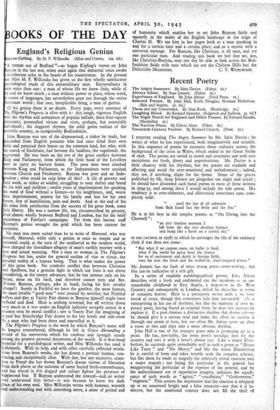OOKS OF THE DAY
England's Religious Genius
Bunyan Calling. By M. P. Willcocks. (Allen and Unwin. us. 6d.)
A TINKER out of Bedford "—so began Kipling's verses on John 5unyan in the last war, when once again that immortal voice awoke reverberent echo in the hearts of his countrymen. In the present war Miss M. P. Willcocks has given us the first wholly satisfactory psychological study of this extraordinary man. Extraordinary in more ways than one: a man of whose life we know little, while of his soul we know much ; a man without power or place, whose word, a scores of languages, has nevertheless gone out through the entire Protestant world ; that rare, inexplicable thing, a man of genius.
Of his genius there is no doubt. Every page, every sentence of The Pilgrim's Progress is alive with it: this tough, vigorous English with the rhythm and assonances of popular ballads, these four-square characters, personified virtues and vices, perhaps, but essentially Individuals ; the doggerel rhymes, the solid green realism of the symbolic country, so recognisably Bedfordshire.
John Bunyan was one of the dispossessed, a tinker by trade, but descended from English peasants who had once tilled their own lelds and pastured their beasts on the common land, but who, with the march of Enclosure, had become the landless, the vagabonds, the oppressed. He was born on the eve of the great conflict between King and Parliament, from which the little band of the Levellers were to carry no harvest home. The poor men were crushed between King and Parliament, as the Independents were crushed between Church and Presbytery. Bunyan was poor and an Inde- endent ; what could he reap from all this? A life of poverty and and work, as tinker or soldier, struggling to eam shelter and bread for his wife and children ; twelve years of imprisonment for speaking the word of God without a licence—to his neighbours, and, worse than imprisonment, anxiety for his family and fear for his own future, fear of humiliation, pain and death. And at the end of his life some little satisfaction from the success of his great book, some little liberty. His was a narrow life, too, circumscribed by poverty, lived almost wholly between Bedford and London, but for the brief experience of Fairfax's campaigns. Yet from this barren stuff Bunyan's genius wrought the gold which has been current for centuries.
No man was more suited than he to write of Mansoul, who was himself, Mansoul, while only a genius at once so simple and so universal could, at the turn of the mediaeval to the modern world, have charged the threadbare allegory of man's earthly journey with a new and actual meaning. Not a man or woman in The Pilgrim's Progress but has, under the general outline of vice or virtue, the detailed reality of a human being. That is what makes the power of this great book. No symbolic conflict that between Christian and Apollyon, but a genuine fight in which our hero is not above considering, as the enemy advances, that he has armour only on his breast, none on his back, and therefore cannot turn and flee. (Private Bunyan, perhaps, pike in hand, facing his first cavalry charge?) Surely in Faithful we have the gentlest, the most human, the most lovable "good man" ever created by novelist; but Faithful suffers and dies at Vanity Fair almost as Bunyan himself might have suffered and died. Here is nothing invented, but all written down very much as it was under an English judiciary savagely unjust in a country torn by moral conflict ; nor is Vanity Fair the imagining of a poet but Stourbridge Fair drawn to the last booth and side-show by a man who had been there and marvelled at it.
The Pilgrim's Progress is the work by which Bunyan's name will be longest remembered, although he left in Grace Abounding a record of his conversion which for candour and strength stands among the greatest personal documents of the world. It is first-hand material for a psychological writer, and Miss Willcocks has used it Judiciously. With its help, and with other carefully collected revela- tions from Bunyan's works, she has drawn a portrait human, con- vincing and exceptionally clear. With due, but not excessive, atten- tion to Freud she has shown Bunyan's dream visions of liberation from dark places as the outcome of some buried birth-remembrance, and has traced in this dogged and valiant fighter the presence of suppressed fear. If Bunyan understood the coward—and no writer ever understood him better—it was because he knew the dark place of his own soul. Miss Willcocks writes with humour, warmth and understanding and with something more, a sense of period and of humanity which enables her to set John Bunyan fairly and squarely in the midst of the English landscape in the reign of Charles II. We see him in her pages both as a man speaking in and for a certain time and a certain place, and as a mystic with a universal message. For Bunyan, like Christian, is all men, and yet one particular man. And reading mis book we feel that we, too, like Christian-Bunyan, may one day be able to look across the Bed- fordshire fields with eyes which see not the Chiltern Hills but the






















 Previous page
Previous page